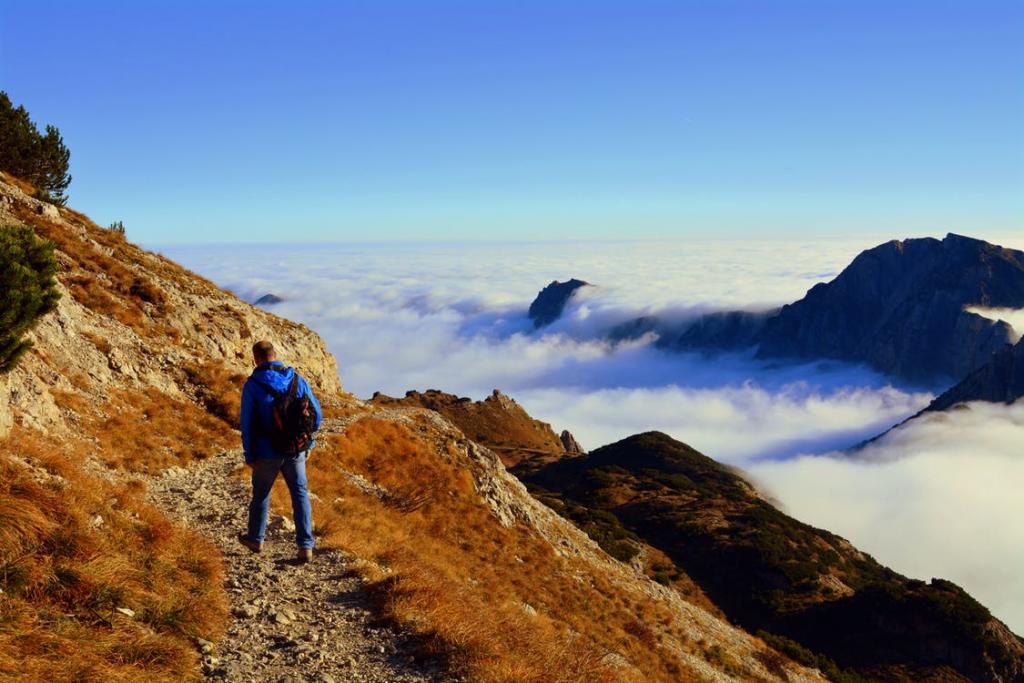You may have expected that enlightenment would come like zap! Instantaneous and permanent. This is unlikely. After the first “aha,” it can be thought of as the thinning of a layer of clouds.
—Ram Dass
Every pilgrim on a journey feels the exhilaration and glow of being liberated. Then, as the work of the new world becomes real and trying, there arises a want to go back to where we lived before awakening. Because in the challenge of growing, we can feel, “Oh, God, this is too hard. I just want to go back to before I was aware.”
Even when we give ourselves completely to life’s journey, there’s always a dweller on the threshold, trying to distract us from what matters, just as we arrive. Like those among the Jews who, after leaving Egypt and experiencing freedom, went to Moses to say, “We really hate the desert. What do you say we go back? Sure, we were slaves but it was clean and we were fed. It wasn’t so bad, was it?” There is always someone among us or some aspect of ourselves that wants things to return to how they were.
This undertow of consciousness is understandable and inevitable. Life always seems to progress by the expansion of revelation and the contraction of hard work. We feel refreshed and then enervated. Being diagnosed with cancer a second time, I awoke after my rib surgery to a kind, gruff nurse who said, “Get out of bed. It’s time to walk down the hall.” Immediately, I felt excited to walk again and overwhelmed that it would be now. My healing showed itself quickly as two steps forward and one step back: two days of getting stronger and one day of feeling weak. I think it’s the same spiritually. We can’t just follow the glide-line of a hawk. We’re in a body that’s bound to the Earth. We’re wedded to gravity. We’re climbing hills and stepping through valleys. Every day has its release and bind. Every revelation opens us to a new form of work.
As we awaken more deeply into the pilgrimage of the heart, there are always new things to lift and new things to build. It’s not just, “Oh, we’re awake! Isn’t everything wonderful?” The path of wakefulness is rugged and slippery every step of the way. And there’s always a part of us just waiting to turn back. When feeling weak or in a weighty place, it’s easy to think, “OK, so I wasn’t awake and maybe I struggled with some form of addiction. Maybe I was in an abusive relationship. Maybe I was in a job where I wasn’t valued and I was humiliated. Or maybe I never valued myself. But today it seems like that was easier, even though I know I shouldn’t go back.”
Addicts know this voice of return well. After years of life unraveling, after hitting bottom and beginning again, all it takes is a gray, stormy day in which life seems to be hiding. It might be while waiting in the rain for the crosswalk to flash its green command to go. And we see someone in the window of a corner bar laughing and it seems that the secret joy of things is on the other side of that window.
Sad lovers know this voice of return too. In the ordinary days of living with a loved one, long after the intoxication of falling in love has faded, a small voice of longing might whisper, “I need to find that spark again.” Suddenly, there’s an ever-present choice: to move more honestly into the relationship we’re in or to feed a secret fantasy, imbuing strangers with a far-off glow we believe we can’t live without. But here, the want to return is disguised as a yearning for what we think will be new.
Since there will always be voices calling us back, a central part of the work of awakening is the need to stand firm in our newfound wakefulness. The beauty and challenge of staying close to what matters resides in the truth that once we’re awake, we can’t un-know what we know. The gift and work of wakefulness is to believe that life is always where we are, no matter what it holds.
Living where we are requires that we bring a tender heart to the brutalities of life. Part of our spiritual work is to sustain the gift of our sensitivity, and to exercise the faith that our sensitivity will reveal itself as the source of our strength. As we negotiate the real work of staying awake, we need to be vigilant with the pilgrim in us who wants to move forward and kind with the fearful one in us who wants to go back. For all I’ve learned, for all my wakefulness and sensitivity, for all the turns in my journey, there’s always a small voice in me ready to say, “Let’s go back. It’s easier to hide.”
I feel this want to turn back because I’m human, even though I’m certain that inhabiting a former self is not really an option. It’s just familiar. The only way is forward, a step at a time, becoming ever more sensitive and resilient. Our enlivened sensitivity is our true enduring strength, by which we keep meeting and appreciating the world.
Once out of our particular bondage, self-made or otherwise, the long pilgrimage of spiritual work demands a commitment to wander into a life of authenticity and truth. Once awake, the journey of our promise is always near and challenging. At the same time, the journey of our bondage is still near and disheartening. This is our crooked path to enlightenment: two steps forward, one step back; two days of being heartened, one day of being disheartened. This is the dynamic of being alive. This is what we work with and for.
A Question to Walk With: Describe a time in your life that you’ve outgrown and your temporary longing to live there again. How do you make sense of this conversation in yourself?
This excerpt is from my book, The One Life We’re Given: Finding the Wisdom that Waits in Your Heart (Atria 2016).
*photo credit: Pixabay














